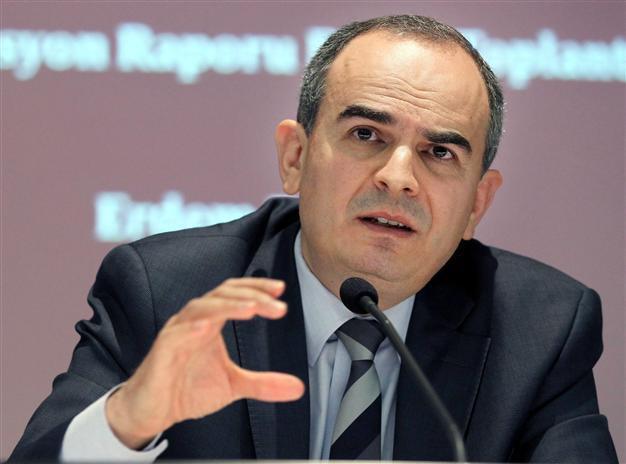Lira plunges despite Central Bank pledge
ANKARA

A file photo taken on July 30, 2013 shows Turkey's central bank governor Erdem Başçı speaking during a press conference in Ankara. AFP PHOTO
The Turkish Lira hit a record low on Aug. 27 even as the Central Bank’s governor said his organization had a war chest of up to $40 billion to defend the currency amid turmoil for emerging economies.The lira plunged to a record low of 2.0385 to the dollar at one point yesterday even though the Central Bank sold $350 million in defense of the lira. The Istanbul stock market fell by 4.73 percent in trading to 65,519 points, having dropped 1.24 percent on Aug. 26 and 6.0 percent last week. The head of the Central Bank, Erdem Başçı, mixed defiance with reassurance, saying the foreign exchange reserves would “never” be exhausted, that interest rates would be contained and that the pressures were a temporary squall.
In an interview with the state-run Anadolu Agency yesterday, Başçı attempted to reassure observers on the prospects for a reversal of a surge in Turkey’s borrowing costs. Başçı said the Central Bank would occasionally apply monetary tightening but the overnight interest rate would not go below 6.75 percent and that it would not climb over 7.75 percent by the end of the year.
However, analysts warned that those measures were too complex and in any case were unlikely to be enough to stabilize the markets. Some said they expected the Central Bank to hold a special policy meeting within a few days.
The Central Bank, statutorily independent, has been under pressure from the government, which has repeatedly said that the bank would do everything necessary to hold interest rates down to sustaining growth.
Başçı signalled that the interest rates would not rise markedly in the coming period. “Believe in me and win,” Başçı said.
Analysts say Turkey, in addition to being vulnerable to the external financing climate and a slowdown in capital influxes, is also unduly dependent on credit and has generated a worrying deficit on the balance of current account payments. After achieving strong economic growth of over 8.0 percent in 2010 and 2011, the government is now expecting growth of 4.0 percent. “It’s my personal estimation that we can sustain a growth of between 3 and 4 percent at the end of the year,” Başçı said.
In July, as pressures built up, the Central Bank reversed a recent rate cut and stressed that it would tighten monetary conditions and crimp credit.
Turkey is being battered by an exodus of capital from emerging economies in Asia, Latin America, Russia and South Africa as investors pull out some funds after signals of a tightening of U.S. monetary policy.
“The current state of the foreign currency is temporary,” Başçı said. “We will strongly defend the value of the Turkish lira.” He added that he would not be surprised if the lira rallied to 1.92 to the dollar, or even stronger, at the end of this year.
“The Central Bank will never run out of net reserves,” he said, revealing that it currently had about $40 billion to defend the lira.
In July, the Central Bank announced urgent measures to support the lira, including a tightening of monetary policy and intervention on the foreign exchange market.
The bank is estimated to have sold $8 billion to boost the value of the national currency. Başçı also forecast that the government’s long-term borrowing cost would fall to single digits after the yield on 10-year government bonds surged to 10.58 percent last week on the secondary market.
The pressure on the economy has been building up in recent months and continued last week despite a decision by the Central Bank to raise its overnight rate by 0.50 percentage points to 7.75 percent, having raised it by 0.75 points at the end of July.
















